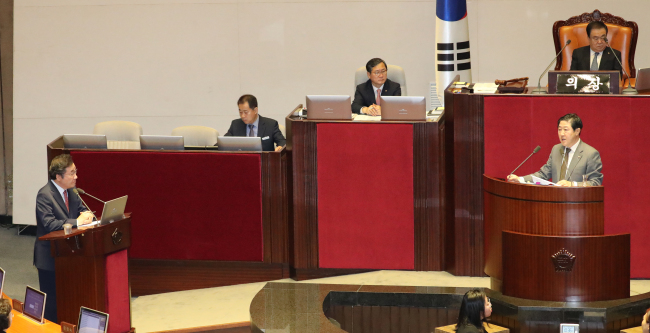A North Korean provocation could nullify all previous inter-Korean agreements: PM
By Jo He-rimPublished : Oct. 1, 2018 - 16:57
South Korean Prime Minister Lee Nak-yon said Monday that a North Korean provocation could lead to the nullification of all inter-Korean agreements, stressing at the same time that Washington-Pyongyang denuclearization talks were pivotal.
At a parliamentary interpellation session on foreign policy and national defense, lawmakers across the aisle clashed over recent inter-Korean agreements.
At a parliamentary interpellation session on foreign policy and national defense, lawmakers across the aisle clashed over recent inter-Korean agreements.

The conservative main opposition Liberty Korea Party attacked the government, accusing the Moon Jae-in administration of having given up on national defense, while the ruling Democratic Party of Korea called for cooperation among rival parties to ratify the Panmunjom Declaration, which the leaders of the two Koreas announced jointly in April at the conclusion of their first summit.
Regarding the “peace zone” that the two Koreas pledged last month to establish in the West Sea to prevent accidental skirmishes in the border region, Rep. Yoo Ki-june of the main opposition Liberty Korea Party criticized the agreement, saying it disregarded the Northern Limit Line -- a de facto maritime border declared by the US-led United Nations Command.
But the prime minister disagreed, saying there was a distinction between the peace zone and the Northern Limit Line.
“The NLL is firmly protected. If we really incapacitated (the NLL), the South Korean residents of the five islands around the border would not let it happen,” Lee said.
The two Koreas have had numerous disputes over the NLL, which was declared in 1953 without North Korea’s consent. North Korea also established a separate Military Demarcation Line, below the Northern Limit Line, and consequently claims South Korea’s five northwestern islands -- Baengnyeongdo, Daecheongdo, Socheongdo, Udo and Yeonpyeongdo. The region has seen a number of military clashes as a result.
Yoo also denounced the series of agreements signed by President Moon Jae-in and North Korean leader Kim Jong-un, saying the two leaders were merely “beating around the bush.” Lee disagreed, saying no past agreements had ever gone so far as to address the dismantling of the North’s key missile engine test sites or its main nuclear complex in Yongbyon.
“Arms reduction should be reciprocal. I do not understand why the suspension of firing and field military drills is ‘giving up’ on our national defense,” Lee added.
When Rep. Ahn Sang-soo of the main opposition Liberty Korea Party asked why no South Korean flag had been seen in Pyongyang during the latest inter-Korean summit, the prime minister responded that it was a protocol observed out of respect for the host. He asked in response, “Would you be able to wave the North Korean flag in Seoul when the North Korean leader visits?”
During the interpellation session, Foreign Minister Kang Kyung-wha also highlighted the role of the United States in the denuclearization of the Korean Peninsula, stating that the US should take corresponding measures to encourage North Korea to open up about its nuclear program.
“The current problem (between the US and North Korea) is trust building, which is why they need to take action to gain each other’s trust,” Kang said, adding that the South Korean government and the US were working together closely to draw up a denuclearization road map for the North.
Establishing a North Korea-US liaison office would be a milestone and should be promoted as a point for negotiation, Kang also said.
By Jo He-rim (herim@heraldcorp.com)


![[Exclusive] Korean military set to ban iPhones over 'security' concerns](http://res.heraldm.com/phpwas/restmb_idxmake.php?idx=644&simg=/content/image/2024/04/23/20240423050599_0.jpg&u=20240423183955)

![[Graphic News] 77% of young Koreans still financially dependent](http://res.heraldm.com/phpwas/restmb_idxmake.php?idx=644&simg=/content/image/2024/04/22/20240422050762_0.gif&u=)



![[Pressure points] Leggings in public: Fashion statement or social faux pas?](http://res.heraldm.com/phpwas/restmb_idxmake.php?idx=644&simg=/content/image/2024/04/23/20240423050669_0.jpg&u=)










